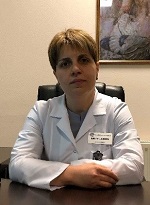Course report
Comprehensive Quality Management in Radiotherapy: Quality Assessment and Improvement - PDF Version
19 April – 17 May 2021, online
Course directors
- Núria Jornet, medical physicist, Hospital de la Santa Creu i Sant Pau (Hospital of the Holy Cross and Saint Paul) (Spain)
- Nicolas Pourel, radiation oncologist, Institut Sainte Catherine (France)
Could you please briefly introduce yourself?
I am a chief medical physicist of the radiation oncology department of the Fridon Todua Medical Center, which was formerly the Research Institute of Clinical Medicine, in Tbilisi, Georgia. We have three linear accelerators (two Truebeams and one EDGE Radiosurgery System) and one brachytherapy unit (the GammaMedPlus iX from Varian). We treat about 1500-2000 new patients each year with all available state-of-the-art treatment techniques, such as: 3D conformal radiotherapy; intensity modulated radiotherapy (IMRT); volumetric modulated arc therapy (VMAT) in the form of RapidArc©; stereotactic radiosurgery/stereotactic body radiotherapy (SRS/SBRT); real-time position management gating-breathing synchronised radiotherapy; and intra-fractional motion management (auto-beam hold). I have actively participated in the establishment of all the advanced techniques in the field of radiation oncology in our country during the past decade.
Why did you choose to attend this course?
During the past decade, radiotherapy has developed rapidly in Georgia in terms of technology, from the simplest 2D planning to the latest advanced techniques. Now IMRT/VMAT, SRS/SBRT, intra-fractional motion management, image-guided radiotherapy, deep inspiration breath hold (DIBH)/4D and intra-operative radiotherapy are available, so that Georgian patients can receive state-of-the-art treatment in their country and do not have to go abroad to be treated, which was very often the case previously.
Experience in countries that have long experience in the field show that use of the technologies must be developed through the interdisciplinary involvement of physicians, radiotherapists, medical physicists, electronics engineers, dosimetrists, quality experts and radiation technologists.
Use of improved technology leads to steady improvement in therapy results, but the complexity of the diagnostic and therapeutic processes requires application of sophisticated control and quality-management (QM) systems.
Therefore, a QM system must be put in place in order to ensure the quality and safety of radiotherapy treatments. This is of high priority nationally and thus, my participation in this course was crucial.
There is an ongoing project in Tbilisi under the City Cancer Challenge Foundation, which includes establishment of a national quality assurance (QA) programme and the creation of a five-10-year radiotherapy development plan. Comprehensive QM in radiotherapy is the main task of this project. This course, which was organised by the European SocieTy for Radiotherapy and Oncology (ESTRO), was very fruitful for me as a coordinator of the Tbilisi project.
What aspects of the course were the most interesting and why?
In my opinion, the whole course, its topics and practical exercises were comprehensive, interesting and well organised. The faculty did a great job as they created a friendly atmosphere for the participants and they made us feel comfortable; they created a sense that, despite the online nature of the course, we were not alone in our separate rooms but instead we were with the active and qualified team in all the discussions.
Did the course activities improve your knowledge and skills in the relevant subject?
Yes, definitely. The course covered the theoretical and practical aspects of different QM strategies that are applied to the field, including how to set up a QM system in a department, examples of how to define quality indicators, methods to monitor and improve quality and how to conduct clinical audits. In our ongoing City Cancer Challenge Foundation project, all these aspects will have to be considered.
Did the course meet your expectations? If so, how?
This course met my expectations completely. The topics were broadly discussed. Also I was able to establish contacts with highly qualified experts, who offered their support in my future activities to establish a comprehensive QM system at the national level.
List the most important ‘takeaways’ following the course.
We need to:
- establish a QM committee/programme in each radiotherapy department;
- optimise all radiotherapy procedures using lean methodology;
- develop QA/quality control (QC) protocols to suit the local structure of radiotherapy processes and achievements;
- implement a local incident learning system;
- introduce nationwide regulations regarding patient-related outcomes and a national follow-up registry for comprehensive statistical analysis of treatment outcomes, survival rates and quality indicator requirements at the national level, which will be accepted by the authorities;
- involve Georgian third parties, such as the Agency of Nuclear and Radiation Safety; the Ministry of Internally Displaced Persons from the Occupied Territories, Labour, Health and Social Affairs; and the Ministry of Education. Their participation in this first preparation phase of the establishment of a QA programme is vital.
How will what you have learnt be implemented in your daily job/ clinical practice?
The Fridon Todua Medical Center is the leading hospital in Georgia, so it has the credentials to manage and coordinate the establishment of a national QM system with the strong support of other hospitals, third parties and the Georgian Medical Physics Association.
How would you encourage someone who has never been to an ESTRO course to join this course next year/ in two years?
I will encourage my colleagues, especially radiation oncologists and representatives of third parties, to participate in this course in order to understand the principles and requirements of QM. We know that quality was initially associated just with QC checks and QA procedures for treatment facilities, but nowadays its profile has been widely increased and QM is a very broad concept that is applicable to all areas of activity of a health-care institution.
P.S.
I wish to offer my deep respect to Karolina Kowalska, committees & education project manager at ESTRO, whose contribution to the organisation of this course was invaluable.

Maia Topeshashvili, MD
Chief medical physicist
Radiation Oncology Department
Fridon Todua Medical Center
Research Institute of Clinical Medicine
Tbilisi, Georgia
maiatop25@gmail.com